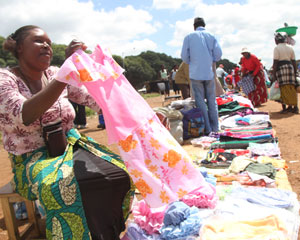
GYNAECOLOGISTS have warned the public against wearing used underwear they buy from flea markets around the country, saying doing so, exposed unsuspecting women to sexually transmitted infections (STIs).
BY PHYLLIS MBANJE
Bulawayo City Council (BCC) recently announced the ban on the sale of used underwear citing health reasons.
But in Harare, the sale of second-hand panties and brassieres (bras) has become a brisk business at most flea markets, particularly at the Charge Office and Mupedzanhamo in Mbare.
Most of the undergarments are stained with unknown substances.
The debate on the sale of second-hand underwear has remained a sensitive issue, and health experts are saying that it could be a ticking time bomb.
Harare-based gynaecologist, Felistus Shambare — who runs a clinic in the Avenues area — said many unsuspecting women were exposing themselves to all types of diseases, including STIs, by using these second-hand panties.
“There is a high likelihood of getting an STI from wearing or sharing someone else’s underwear,” said Shambare. “Some bacteria is very resistant and can survive the conditions, long enough to infect someone. Pubic lice have been known to survive the harshest conditions, and are not easily killed. These little parasites can cling tightly to a certain spot and even a general wash might miss them”.
- Chamisa under fire over US$120K donation
- Mavhunga puts DeMbare into Chibuku quarterfinals
- Pension funds bet on Cabora Bassa oilfields
- Councils defy govt fire tender directive
Keep Reading
Another gynaecologist and obstetrician, Martha Stevenson, said it was high time the government adopted a sterner stance against the practice.
“I tell you, although there has not been tangible evidence to link the used underwear with any particular incidence of an infection, the possibility is there,” she said. “We are constantly presented by our patients with the strangest types of infections. We cannot rule out that such practices could be contributing to these odd diseases. No one knows what kind of chemicals are used to preserve the items during their sea voyage.”
Stevenson also warned women against washing the underwear with bleach or stronger solutions.
“It is possible that one might fail to totally rinse out the solution, and whatever chemicals that form part of the bleach might harm the ‘sensitive’ parts.”
A nurse from Belvedere council clinic also said it was unhygienic to wear used underwear, just as much as it was unethical.
“It is unhygienic and according to our African culture you cannot share undergarments with someone else,” she said.
But people who spoke to Standardcommunity last week were reluctant to take advice from health experts.
“If you wash it thoroughly the stains come off. It’s just dust and dirt because these items come from faraway places. Many people including the prospective buyers handle the stuff with bare hands, which are not always clean,” said one undergarment vendor, who spoke to Standardcommunity in Harare’s central business district.
“Even if you buy new underwear, unless it is sealed, you will still wash it before you wear it, so there is nothing peculiar about washing used underwear,” said another vendor who identified herself only as Anna.
She added: “It is good business and besides, women want to look good and prefer the labels that we sell.”
True to her word most of her wares comprised known labels like Wonderbra and Victoria’s Secret.
“People prefer labels more than the fact that it has been worn before. The items last for a long time, unlike the dollar for two [items] that people buy in shops. They may be new but they are not strong. Mazhing zhong chaiwo [They are not strong]” said one Aaron Poshai.
They advertise the wares by shouting, “Svikai muone US$1 bra yekuStates ichangovhurwa bhero (Come and see, a bra from the US going for a dollar).
UNCOMMON PRACTICE FOR AFRICANS
Other people however discouraged the practice.
“People should be careful; the satanists are now very clever they use all sorts of ways to lure innocent people into their cults,” said Tatenda from Waterfalls. “Those items might have been offered to the dark one first, and anyone who wears them might end up behaving exactly the way they want them to.”
Gogo Mazhenje, who sells vegetables along Fourth Street, said it was not common practice that African women wear used underwear. “During our times when we were growing up, that was not allowed because you could end up with numerous problems like jeko [period pain]” she said.
Harare City Council has seemingly turned a blind eye on the issue, as more and more vendors are openly selling the underwear. Council spokesperson, Leslie Gwi-ndi had not responded to an email sent to him by the time of going to print.
Finance minister Tendai Biti once said, any man whose wife wore used underwear should consider himself a failure.











